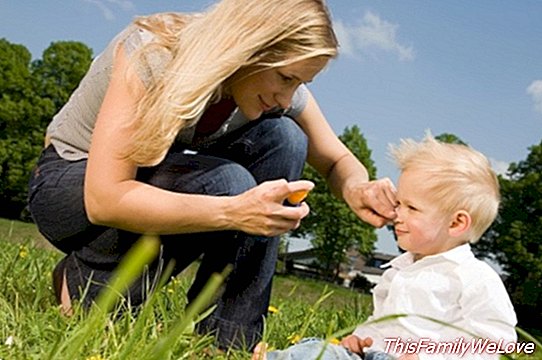How to avoid biting your baby's bugs

The stings of almost all insects are innocuous, but some can be very dangerous and even fatal. Follow these recommendations to help your baby spend a quiet summer, without discomfort or allergic reactions caused by mosquitoes, wasps, spiders and even bees. Prevention is the best solution.
To avoid bites outside the home
The normal thing now that summer comes is for your baby to spend a lot of time outdoor so take note:
1. Dress him with light colors and garments that cover your legs and arms.
2. Avoid, to the extent of your possibilities, lwarm, very humid places or swampy environments (stream banks and rivers), where insects proliferate. If you go to these sites, use natural spray repellents and move the cart away from flowers, shrubs or stacked wood.
3. Try to protect with Tulle mosquito nets the stroller and its cradle. Another option is the mosquito nets in the windows.
4. Avoid the colony if you are going to be outdoors and, on the contrary, use repellents of natural origin. Look for sunscreen creams that do not wear perfume.
5. Do not lay your baby directly on a blanket placed on the lawn or grass. This will prevent ant stings and, worse yet, small spiders.
To avoid bites inside the house
The insecticides of plug are an effective solution to avoid mosquitoes during the night. They are not harmful in babies' room, but plug in the diffuser for half an hour before you put your child to bed and keep the ventilation of the room. If you are going to sleep with the windows and door closed, unplug the diffuser when you put it down.
Insect repellents, although they may be more effective, nor you should apply them directly on your child's skin, because they include toxins harmful to the baby's skin. Try other repellents made with natural products derived from plants, such as citronella. Although its effect is reduced to 10 minutes they are not so harmful. Other new products (which are still being tested) are: 2% soybean oil or eucalyptus oil.
Finally, lUltrasound-based devices are ineffective, as are bracelets. The repellents in candles only work in short distances, therefore, spreading them in the environment has little effect.
What to do if your baby is bitten by a spider or wasp
If it is a bee sting or wasp:
1º. Extract the sting by scraping over the stinger (which looks like a splinter) but never trying to pull it with your fingers or with tweezers, as you could end up squeezing more poison into the skin.
2º. Wash meticulously the site of the injury and the surrounding area with soap and water.
3º. Covers the site of the bite with ice (wrapped in a piece of cloth) as quickly as possible, for 10 minutes, remove it another 10 minutes and repeat the process. You will help relieve pain and prevent swelling.
4º. If the itching is very intense, can you give him a oral antihistamine, or apply a cream containing corticoid. Do not apply mud or saliva.
5º. Observe your child during the following days, for make sure it shows no signs of infection, such as increased redness, swelling or pain.
Although spider species in Spain are usually harmless, in principle, if you are certain that your child has been chopped by a spider, consult a doctor as soon as possible. He will decide if it is necessary to administer oral analgesic and antibiotic treatment, as well as some specific antidote.
At this early age there is look out close up lpossible allergic reactions to insect bites, which usually occur within 20 minutes after the bite. Remember that if your baby is allergic to bites, you should always carry an emergency kit, a card or a bracelet, to warn others of your allergy.
Ana Aznar
Advisor: Dr. Virginia González Ojeda. Head of the Pediatric Service. La Zarzuela Hospital Madrid
It may interest you:
- How to cure a jellyfish sting?
- Walking with the baby




